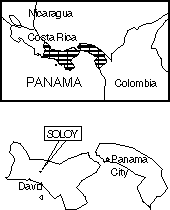
Twenty-three-year-old Tahireh Sanchez is one of a new generation among the Guaymís in Panama. She works at Radio Bahá'í Panama, broadcasting in her native language and working to help preserve her traditions and culture.

Loosely bound by a common language and diffusely settled in the rugged Cordillera Central mountains in Western Panama, the Guaymís exist largely on the margins of Panamanian society and have historically been among its poorest members.
For years, their traditional lands have been slowly consumed as "Latinos" -- which is what the Guaymís call Panamanians of Spanish descent-- have moved into the region looking for farm and grazing land. Pushed ever farther into the remote and less productive highlands, the 80,000 Guaymís have been increasingly unable to support themselves with the slash and burn agricultural techniques they have relied on for centuries.
To survive, families have sent their young men out to work in coffee and banana plantations for a few months each year. But this has come at great cost to the community and family structures here.
Vulnerable to exploitation because of their unfamiliarity with the Spanish language and culture, Guaymí men often have had to work in unsafe conditions for very low wages. And the long separations have opened the door to alcohol abuse and a loss of their cultural identity.

In response, some Guaymís have turned inward, manifesting an increasing distrust of outsiders, albeit at the risk of an even lower standard of living. Others have accepted Latino ways, seeking to accommodate the outside world, though such a move sometimes takes them even farther from their roots.
And then there are the Guaymí Bahá'ís, who have embarked on a rather bold path that appears to offer a way of preserving elements of culture of which they are most proud and at the same time giving them tools to control their own destiny.
Over the last 30 years, some 8,000 Guaymís have embraced the Bahá'í Faith, attracted to it, some say, because of indigenous prophesies that spoke of the coming of a new religion of unity. In the process, Guaymí Bahá'ís have built a distinctive community within a community, one that both serves to strengthen and reinforce their own culture while at the same time promoting such "progressive" principles as equality of women and men, racial and ethnic tolerance, and education for all.
"Among ourselves, we are very kind and socialize a lot,"
said Tahireh Sanchez, a 23-year-old Guaymí whose parents
were among the first Guaymís to become Bahá'ís.
"But with the outside people, we are very afraid to talk
to them and relate to them. But in my family, I was taught to
socialize with others and to treat everyone as equals. So this
allows me to go out and make friends with all people. I will do
this because I understand that women are equal to men -- and also
that Indians are equal."

This process of community-building, which has been accomplished with very little help from outsiders, can further be understood as a rather extraordinary case of grassroots-based, participatory development practices.
The fruits of this effort -- which has a long way to go before it can be fully judged -- can be seen most vividly in the system of community-based tutorial schools the Guaymí Bahá'ís have established, which operate in up to 11 villages.
The schools have quite clearly had an influence on the entire community. Not only have they increased the general level of literacy, but their moral content has helped give an entire generation a renewed appreciation of their own culture while at the same time providing a yardstick for evaluating what is good and bad in the outside world.
Other aspects of this community-wide development process can be seen in a series of projects which are conducted under the auspices of the Guaymí Cultural Center, located here in Soloy. The Cultural Center, built by the Guaymís themselves with some materials and technical advice from national and international Bahá'í communities, serves as a regional training and conference center for the Guaymís. In this role, it not only provides a critical element of support for the tutorial schools but also offers a platform for launching other community efforts.
Managed by a committee that includes both Guaymí and Latino
Bahá'ís, these broader efforts include a project
to experiment with and introduce new agricultural techniques,
a forum to create and encourage new leadership capacities among
the Guaymí young people, and the sponsorship of culture
and folklore festivals. The Center is also associated with Radio
Bahá'í Panama, a community-based radio project,
which itself has had a huge impact on preserving Guaymí
culture and language.
 (e-mail: 1Country@BIC.Org)
| Contents
| 1994 Issues
(e-mail: 1Country@BIC.Org)
| Contents
| 1994 Issues